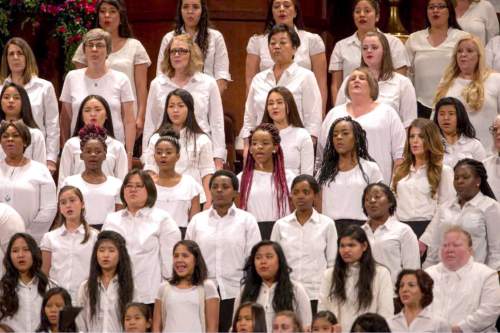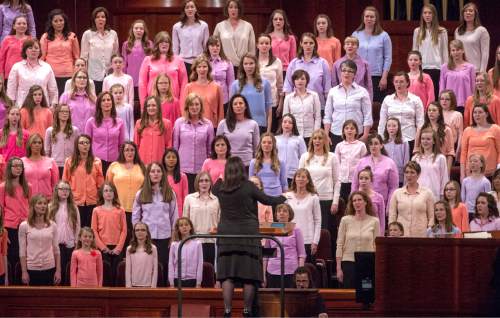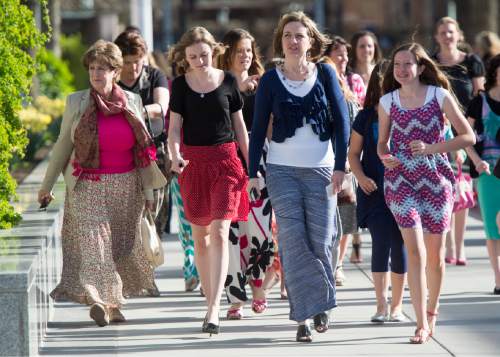This is an archived article that was published on sltrib.com in 2016, and information in the article may be outdated. It is provided only for personal research purposes and may not be reprinted.
If a married woman helps oversee the physical and mental health of 200 LDS missionaries, isn't there a better way to describe her than as the "mission president's wife"?
That's a question the Mormon women's journal, SquareTwo, asked its readers a couple of months ago. And 96 percent of 463 respondents — all female — answered with a resounding yes.
"The majority (58 percent) suggest also calling her 'president,' [like her husband] or some variation: co-president, presidentess, presidenta," Valerie Cassler, founder and editor, and Neylan McBaine, author of "Women at Church," reported in the journal's recent issue.
A common response, they noted, was that both partners "be president as they are both serving."
This was one of a handful of questions about Mormon women's titles the journal posed to its readers in its unscientific survey.
Almost as many commenters (82 percent) favored replacing the term, Heavenly Father, with Heavenly Parents in the faith's Young Women theme, repeated weekly by those ages 12 to 17, so that it becomes: "We are daughters of our Heavenly Parents, who love us and we love them."
Mormons believe in a divine Father and a divine Mother.
"The current version [of the theme] is absent any indication that the heavenly family includes both a Mother and a Father, as we are told it should on earth," Cassler and McBaine wrote, "and this absence is especially pernicious to Young Women who are learning by very definition to model divinity."
Then there's the issue of what to call the Young Women subgroups, currently dubbed Beehives, Mia Maids and Laurels.
About 75 percent favored new names for those classes, including 14 percent who would like to see only Mia Maids changed.
"The term 'maid' does not mean now what it once meant ('maiden'), and connotes in the 21st century an often ill-paid and unskilled housekeeper," the authors explained. " 'Maid' is an ancient virginal reference,' said one respondent. 'Girls (at least American) these days think of 'maid' only as in hotel housekeeping,' " said another.
MIA refers to "Mutual Improvement Association," which no longer exists in The Church of Jesus Christ of Latter-day Saints.
The names feel "dated and lacking weight," some commenters lamented, when compared with the teenage boys' classes: Deacons, Teachers and Priests.
Some 14 percent of respondents would like the Young Women groups to be Deaconesses, Teachers and Priestesses, Cassler and McBaine wrote.
"We are anointed the same as them in the temple," one commenter said. "Why not recognize that as youth progress toward the temple?"
Others suggested an array of alternatives, including: Deserets, Seekers. Shepherds, Lambs, Lanterns. Fledglings, Meadowlarks, Eagles, Rubies, Emeralds, Diamonds, Pioneers, Pilgrims, Nobels. Shepherds, Scholars, Disciples, Endeavor, Strength, Purpose, Prioress, Abbess, Priestess, Junior, Leaders, Novices, Apprentices, Ensigns, Beacons, Builders, Achievers, Officers, Evangelists, Faith, Hope, Charity, Preachers, Warriors, Queens and Guides.
"Nothing that compares Young Women to flowers, fruit or other 'objects,' please," counseled one commenter. "Maybe something like Sowers, Messengers and Shepherds — more duty-oriented."
A high percentage (90 percent) wanted to see the church change the name of the award given to female teens for achieving religious goals, now simply called Young Womanhood. They yearned instead for more parallelism with their male peers, whose award is called Duty to God.
Some respondents thought both honors should be called Duty to God Award but those who favored keeping some distinction proposed terms such as Personal Spiritual Achievement, Witness of God, Path of Wisdom, Leadership Award, Commitment to God, Divine Service Award, Faith and Works Award, Discipleship Award and Duty to Goddess Award.
"This survey was only open to women because we were specifically interested in the exercise of women naming themselves, rather than letting men describe women and what they do," Cassler and McBaine wrote. "These statistical results and the hundreds of comments that accompanied them serve to confirm that the names of women's organizations and roles in the church are awkward at best and demoralizing for most."
The chance to consider their own names — and by extension their own purposes — within institutional Mormonism, the authors argued, "was a meaningful and reflective experience for all respondents."
And for good reason, Cassler and McBaine concluded. "The depth of our faith community's understanding is reflected in the names we use."
Peggy Fletcher Stack







